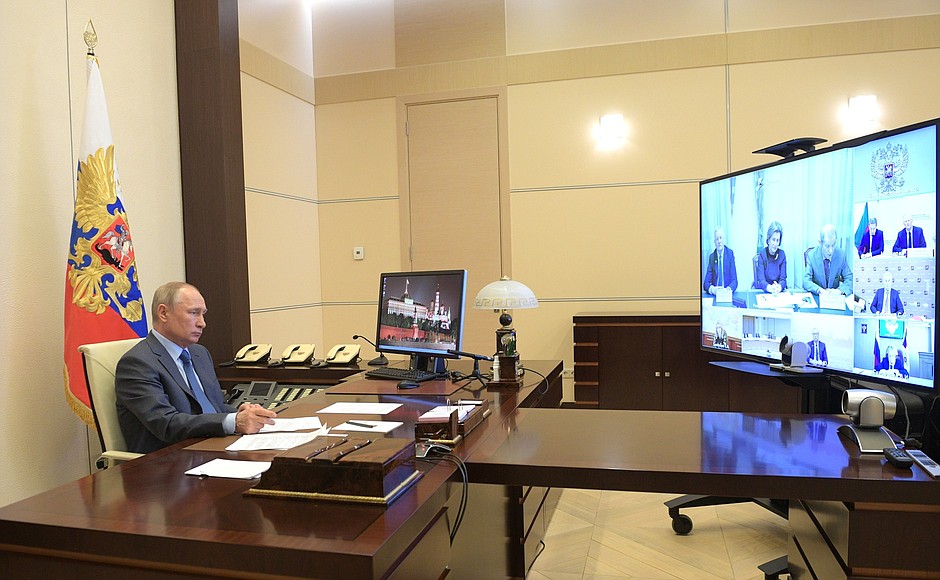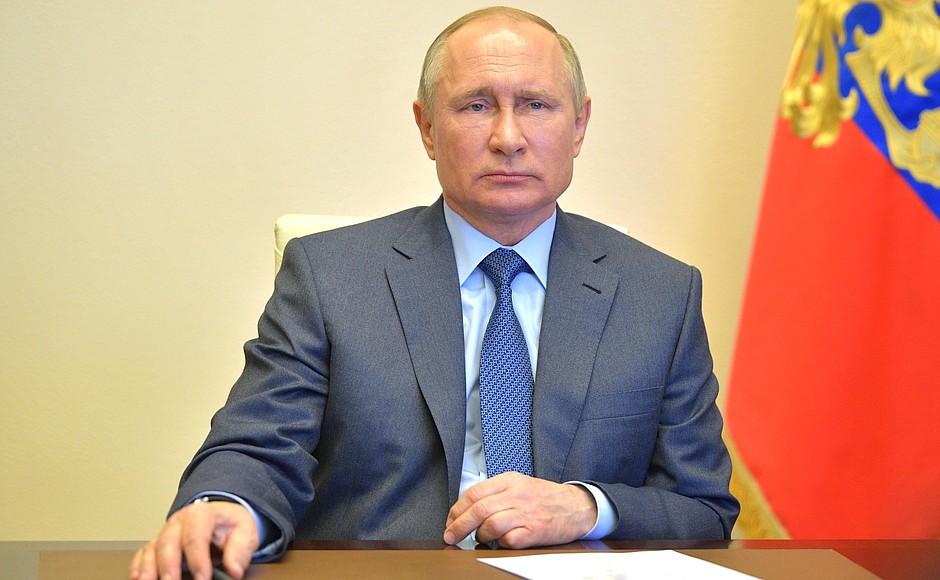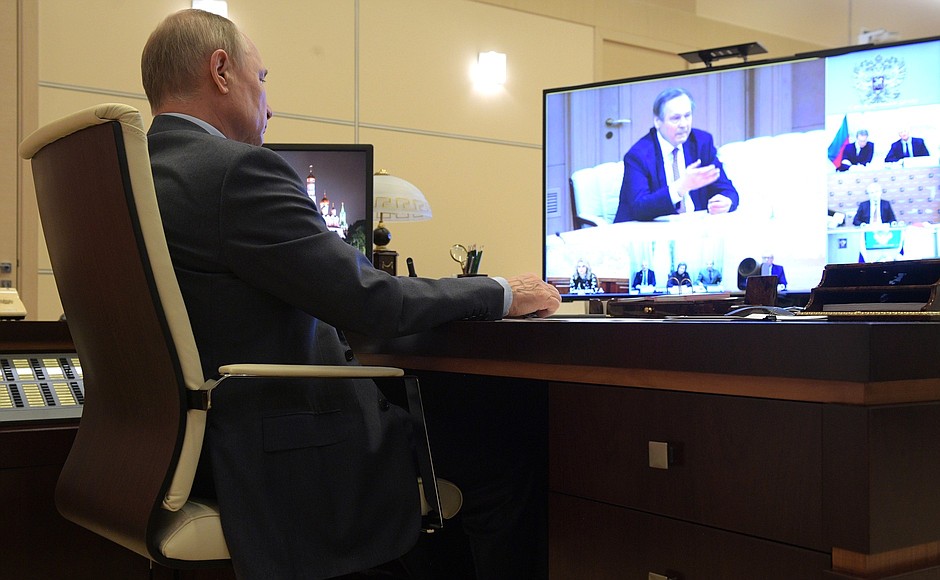President of Russia Vladimir Putin: Good afternoon, colleagues.
Taking part in our work today are experts in countering epidemics, leading virologists, infectious disease specialists, as well as heads of research centres.
Your professional assessments and recommendations are vitally important for us, federal and regional authorities. This is why we will constantly be keeping in touch with you.
You are well aware that the situation remains difficult. Regrettably, the epidemic keeps spreading. The number of people infected with the coronavirus is growing, and not only in Moscow which was the first to encounter the threat. However, we understood, knew and were preparing for this, we knew that the epidemic would begin to spill over to other regions. Unfortunately, this has also happened.
However, we managed to somewhat rein in and slow down this process by carrying out preventive measures. Nevertheless, the infection has already been registered in 85 regions of the Federation, unfortunately, even if it is a matter of several cases.
I know that you and your colleagues analyse this information carefully and compare the received data with the situation in other countries. Your conclusions reaffirm that in general we are managing to solve the tasks of the first stage of countering the epidemic, namely, slowing down its spread.
However, we must by no means take things calmly. According to specialists – I mean you and your colleagues – the peak of morbidity is still ahead of us. And now we must do everything to flatten the peak when the highest number of new cases is recorded.
Now work is underway in all areas, including an additional specialised bed stock that will be deployed in all the regions by the end of this week or the beginning of the next one. Let me repeat, we are considering all possible scenarios in our preparations.
In this connection, I would like to ask you how you assess the current situation and the speed with which the epidemic is spreading through Russia. What prognosis can you give for the next say three, seven or ten days, or a month, including the number of cases with severe complications requiring urgent hospitalisation, which is also very important?
Do we have enough reserves already? I do not only mean specially equipped beds in hospitals and infection departments but also the supply of medicine, ventilators and individual protective gear as well as the forming of new medical teams.
Let me stress that increased, reliable protection from the infection must be ensured for medical personnel, and right now every single one of them counts. What additional recommendations can you give now?
Prevention is the next important subject I would like to discuss with you.
We have gained a certain amount of time due to the announced period of non-working days, quarantine measures, self-isolation rules and other previous decisions. As I have already mentioned, we have managed to slow down the spread of the epidemic and readjust the healthcare system.
Do you think the introduced prevention measures, including in Moscow, are enough? What else do you think we should do today? What additional preventive decisions do we have to make?
I would like to reiterate, we will be guided by the most important thing, the protection of the lives and health of people, and we will use expert opinions when introducing the safest ways to operate industries, enterprises and companies. We will act very carefully because we understand that it is impossible to stop the economy completely. But we need to minimise the negative impact on the employment and incomes of citizens. People are extremely concerned about this.
I would like to hear today about how work is proceeding in creating a vaccine. I understand that complex and painstaking research is being conducted now. It is impossible to say anything for certain here. It is not enough to develop a vaccine; it also should be proven in terms of its efficiency and safety. I understand that a huge responsibility now lies upon the scientists. Nevertheless, I would like to ask you to tell me your opinion on the possible terms of development of a vaccine. We need to know this now so that we would be able to reserve and prepare industrial capacities to launch the production in the necessary volumes.
What additional financial and organisational assistance do these research groups need? Rest assured, I will give the necessary instructions immediately.
I know that the search for new treatments, new drugs and their combinations is underway. How, in your opinion, can we use the experience of other countries in this field?
Anyone can get affected by this disease, and it is crucially important that medical personnel have algorithms to provide patients of all ages with efficient treatment, including those with comorbid chronic diseases.
Of course, special attention should be paid to pregnant women, future mothers, and children, including newborns. I would like to ask you to consider this very carefully.
I know that we will be able to talk to our colleague from St Petersburg; we spoke by telephone recently and I ask him to speak today too.
But before we get down to business, please report on the current data on the coronavirus situation in the country and in Moscow, the city with the largest number of cases.
Ms Golikova, the floor is yours.
Deputy Prime Minister Tatyana Golikova: Thank you, Mr President.
Today there are 47,121 registered cases in the Russian Federation, with an increase of 10 percent over the last 24 hours.
Every time we focus on the Moscow agglomeration, which is Moscow and Moscow Region, I will give the latest numbers concerning Moscow and Moscow Region. The increase in Moscow was 8.3 percent, although Moscow has the highest number of cases, as of today: 26,350; the increase in Moscow Region is 12.4 percent and the number of cases is 5,241.
Now to the other part of Russia, without Moscow and Moscow Region. Over the past 24 hours, the increase in cases was 12 percent.
In general, other Russian regions are two or three weeks behind Moscow and Moscow Region on average in terms of the speed of the spreading and development of the illness. The number of cases in the Russian regions except Moscow and Moscow Region is 15,530.
We assess the situation with the spread of the novel coronavirus infection proceeding from the number of cases per 100,000 people. Today the average number is 32.1 per 100,000. This number is higher in nine regions: Moscow, Moscow Region, the Republic of Ingushetia, the Republic of Komi, Murmansk Region, Magadan Region, the Republic of Mari El, the Republic of Mordovia and St Petersburg. The lowest number per 100,000 is in Kemerovo Region.
As of today, one of the highest levels of coverage with testing is noted in Russia. As of this morning, 2.53 million tests had been carried out. This is the second highest result in the world. Such a volume of testing allows us to actively identify asymptomatic forms, which are epidemiologically important.
Last week the share of asymptomatic cases among the new ones was 44 percent on average.
I would also like to note that we cannot simply compare the number of known cases in Russia and in other countries where, for example, only people with symptoms or serious diseases are subject to testing.
Now to focal morbidity and focal distribution. As of this morning, there are 285 hotbeds of the disease in Russia, with 4,704 observed patients there in total. Mostly these are various medical organisations, but also social service residential agencies and others. We are working here to control the hotbeds as much as possible and to prevent the spread inside them and from them.
The greatest number of cases is due to the hotbeds. These are the Republic of Komi, the Republic of Sakha (Yakutia) and Murmansk Region where the large number of cases is due to such serious hotbeds there.
Now just a few words about the age breakdown of the disease in the Russian Federation. To date, the average age of patients in our country is 47.9 years for women and 44.7 for men.
As for people over 65 and children, here the trends are approximately the same as at the beginning of the disease in Russia. But I would like to note the following: if the share of children under 17 is 7.6 percent, and this corresponds approximately to the general trend that has developed in the world, then the share of 65-plus cases is 15.5 percent. This is lower than in other countries, and is mainly due to the fact that we made a decision in advance on the self-isolation of these citizens with the possibility, if they are working citizens, to take sick leave and, accordingly, not to fall ill. According to our data, these events yielded an appropriate result.
Now, as you said, Mr President, the regions, despite the fact that the disease is still growing there, still have a certain lag to prepare the medical network for these patients.
As you know, today the Russian Government made all the necessary decisions to allocate funds and prepare the needed beds. This effort is ongoing. The Russian regions are working very quickly, despite the difficulties and problems that arise; everyone is taking full responsibility for this.
I would also like to note that we are working very closely with our colleagues, who are here today, and our other experts and scientists. I would like to emphasise once again that representatives of scientific organisations, the Ministry of Health, the Russian Academy of Sciences, the Ministry of Science and Higher Education, Rospotrebnadzor and the Federal Medical-Biological Agency are working hard on a new vaccine and searching for medicines.
Of course, we already have some plans, but I do not want to get so far ahead now. I believe my colleagues will talk about this themselves.
Thank you.
Vladimir Putin: Thank you very much.
The regions certainly require more attention. We agreed with the Prime Minister that he would hold a meeting with our colleagues from the regions in the near future. It will be necessary to look at the regions where the problems have accumulated the most, and those that work efficiently, for example, like Mr Tsivilev in Kemerovo, as you said. We need to look at these best practices and implement them throughout the country.
Thank you very much.
<…>
Vladimir Putin: Our colleagues have touched upon many important issues. I am very grateful for that.
One of the issues that has also been mentioned briefly is providing our medical facilities with the necessary equipment, instruments and protective gear.
I must say, our own industry is boosting production volumes. I will say a few words about it. We are actively cooperating with our foreign partners. For instance, we sent two million masks to China in February, when they had a difficult time there. As of today, China has provided us with 150 million masks via various channels.
We are expanding and boosting our own production capacities. As of the beginning of March, we were producing 1.2 million masks per day. Plans call for producing 3.5 million masks and in the near future 7.5 million masks per day. In addition, small and medium-sized companies have launched the production of 5.8 million hygienic masks.
As for hazmat suits, some 1.7 million of them have been delivered to Russia. Our own production has increased from 6,000 in mid-March to 20,000 suits. Plans call for producing over 100,000 suits per day by May. In addition, 2 million protective suits have been brought from China, and this work will continue.
Respirators. Their production has doubled over the past month to 280,000 per day. China has provided us with 2.5 million more; some 700,000 will be delivered before the end of April and another 2.6 million in May. As I have said, we have broad cooperation with our colleagues in this area.
We have enough antiseptic products and do not need to import them.
It is widely known that we have begun practical cooperation with some partners in Italy. We have also sent our military doctors and equipment there, as is known, from our civilian agencies, from the Ministry of Healthcare.
I would like to say that this is not just a one-sided relationship or a one-way street. We purchase pressure sensors in Italy, and without them, it is impossible to manufacture ventilators in Russia. And this cooperation is growing.
The day after our military transport aircraft carrying equipment and protective gear landed in New York City, we signed a contract with our US partners to purchase airflow sensors, which are also necessary to manufacture ventilators in Russia.
I am confident that this cooperation will continue to develop. But there are things we are doing from scratch and quite effectively. For example, we have never produced single-use breathing circuits for ventilators. Today one of our companies has launched the production of single-use breathing circuits for ventilators. In April, 80,000 will be produced. Starting in May, the company will produce 200,000 circuits per month. And, of course, such work will continue in all areas.
My colleagues have spoken today about many important issues. By the way, Mr Nikolai Filatov said that there was a broad-spectrum vaccine developed previously. I would like to ask the Minister to report to me on this, not now but later.
The same goes for the use of Russian antivirus medicines. We have spoken with several colleagues of ours. The last speaker, Mr Yury Lobzin, the director of a children’s clinical research centre from St Petersburg, also spoke about this. We will have to return to this later, in the course of our work. I am addressing this to my colleagues from the Government.
The same applies to the “vaccine” amendments to legislation, including Government Resolution No.441, the allocation of additional resources and so forth. We will discuss all of this with my colleagues from the Government later.


